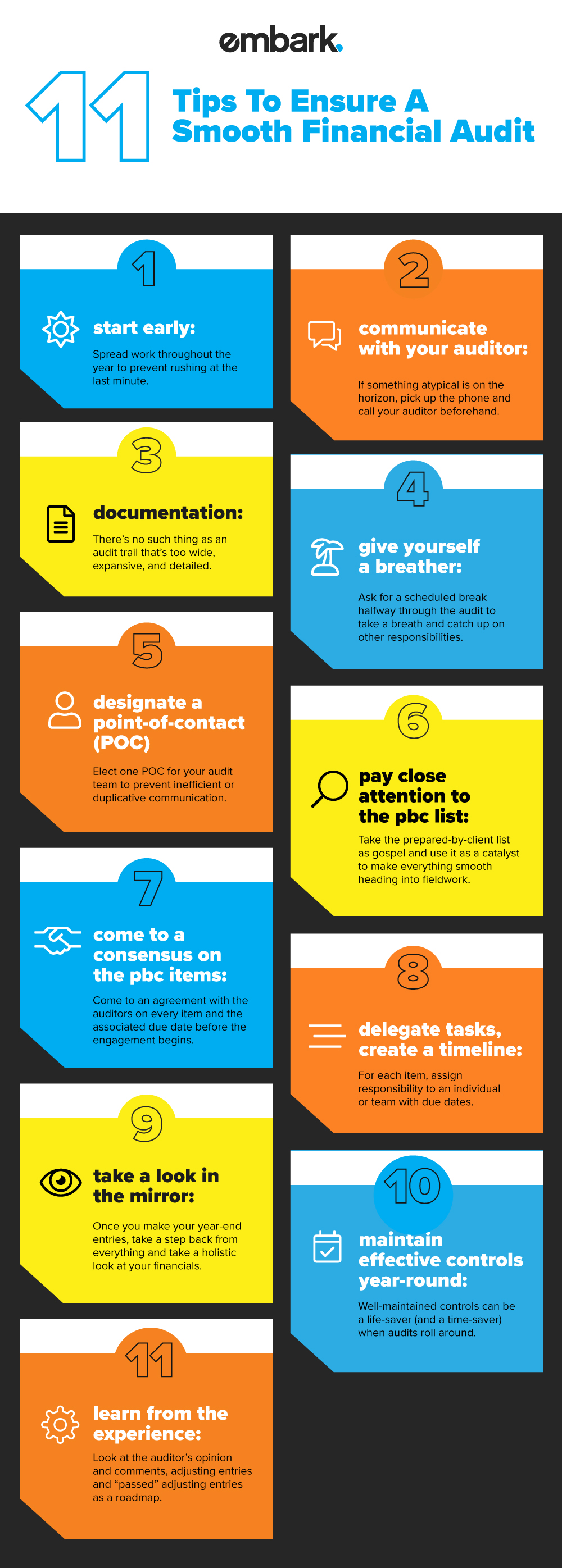Updated December 2023

Audits are challenging enough without shooting yourself in the foot. And as good as we are here at Embark with our kernels of wisdom and experience-driven guidance, we can’t prevent shivers from running down your spine when you hear the “a” word. However, we can assure you there’s no reason to be scared of the big, bad audit report wolf.
Therefore, to make life easier for you, your stakeholders, and your loved ones who put up with your nervous habits when an upcoming audit gets near, take these tips to heart to ensure a far smoother audit. They might not make the experience the financial equivalent of wine and roses but, if deliberate and organized with your approach, can certainly take much of the edge off of the experience for a CFO and their team.
- Start early: Hurried audit preparation is poor audit preparation. Spread things throughout the year to prevent rushing the process at the last minute. Make your timelines readily available to everyone on your team so everything is easily tracked and kept on schedule.
- Communicate with your external auditors: Minimize the impact surprises wield on your audit. If a complex or atypical transaction is on the horizon, pick up the phone and call your auditor beforehand. Starting with the correct accounting treatment alleviates many headaches down the road.
- Documentation: There’s no such thing as an audit trail that’s too wide, accounting records too expansive and detailed. Document anything you suspect might be material for your audit, ideally in an organized, tech-driven manner that makes wading through that beautiful audit trail straightforward and convenient.
- Give yourself a breather: If the scope of the audit is expansive and is likely to stretch out over a significant timeframe, ask for a scheduled break halfway through to take a deep breath and catch up on your other responsibilities. Remember, the audit always takes precedence, but that doesn’t mean you hit pause on your operations during the engagement.
- Designate a point-of-contact (POC): Accounting and finance are team efforts, communicating with your auditors is not. Elect an individual to serve as the POC, an audit liaison that prevents inefficient or even chaotic communication from overwhelming the audit process. Or your countless business processes, for that matter. That person is the conduit that all questions and concerns for the auditors run through.
- Heed the (prepared-by-client) PBC list: You’ll receive a PBC list before the engagement begins. Take this as gospel and use it as a catalyst to make everything smooth heading into on-site fieldwork. Going through all of the financial records and data the audit firm requests also helps ensure you start with a crisp and clean trial balance, no lingering questions remain, and the audit team can hit the ground running without delays.
- Come to a consensus on the PBC items: Speaking of the PBC, come to an agreement with the auditors on every PBC item and the associated due date before the engagement begins. This leaves time to ask and answer questions or address audit issues that will inevitably arise.
- Delegate tasks, create a timeline: For each PBC item, assign responsibility to an individual or team, including a specific completion date. Once again, gather those different tasks and timelines into a spreadsheet that everyone involved can access to maintain transparency and efficiency across your entire team.
- Take a look in the mirror: Once you make your year-end entries and closing is in the rearview mirror, take a step back from everything and take a look at your financials. Does everything look okay? Are there any items or areas that don’t pass the proverbial smell test? While you’re at it, make sure all needed disclosures are in place and ready to go.
- Maintain effective controls year-round: Well-maintained internal controls can be a life-saver when your audit rolls around. Make sure you have mechanisms in place that, for instance, properly code invoices to the correct general ledger (GL) account. Ensuring the accuracy of such items on an ongoing basis drastically reduces the chances of a miserable audit experience.
- Learn from the experience: Always build on what you’ve learned from previous audits, ensuring that it’s a continually-improving process that refines itself over time. Like it or not, you never reach the top of the audit mountain and will always find areas of improvement. In fact, look at the auditor’s opinion and comments, adjusting entries and “passed” adjusting entries as a roadmap for improving your organization and your next audit, not as an indictment on everything you hold dear in life.
This list obviously isn’t exhaustive and, by design, sticks to the high-level side of the guidance. Building a consistent, reliable audit plan and framework is fundamental to getting the most from the process, ensuring a smooth audit, and keeping the pre-audit jitters at bay.
That said, if you find that your financial house needs some tidying to prepare you for audit success, Embark is always here to analyze and improve your controls, clean up your company’s financial statements, or integrate finance transformation tools to streamline your operations. It’s what we do, we’re darn good at it, and we’d like nothing better than to help you view a financial statement audit as an opportunity rather than something that keeps you up at night.








